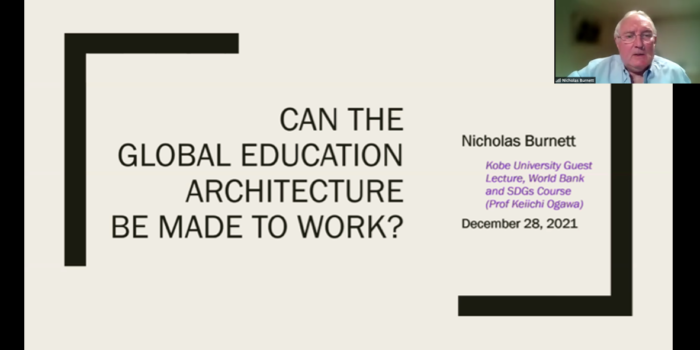Internship at Ministry of Education in Timor-Leste (Takao OKAMOTO)
I had the opportunity to conduct my internship in the Ministry of Education (MoE) in Timor-Leste from August of 24th to September of 28th 2015. I was initially attached to...
Graduate School of International Cooperation Studies (GSICS), Kobe University


On December 28th 2021, as one of the “World Bank and the Sustainable Development Goals” (SDGs) series, Dr. Nicholas Burnett, the former World Bank Sector manager, currently board chair of UNESCO IIEP delivered a lecture on the theme of “Can the Global Education Architecture Be Made to Work?”. The education global architecture consists of UN agencies, bilateral institutions, multilateral institutions, multilateral banks, and philanthropies that influence the international agenda of the sector. Dr Burnett proposed six desirable functions: (1) Leadership, (2) Norms and Standards, (3) Technical and Knowledge Support, (4) Monitoring, (5) Accountability, and (6) Finance. According to his analysis, leadership and accountability is not enough and need to have more effort, while norms and standard, monitoring, technical support, and finance are relatively well managed.
“Everybody should be educated”, to achieve universal primary education, but it still won’t be achieved by 2030. In developing countries, Sustainable Development Goals (SDGs), goal 4 cannot be met by 2030. And that is because the global education architecture is not effective. Dr Burnett pointed out that the current education architecture is unrepresentative, it is missing the voice of developing countries and private education sectors. Adding to it, current global education systems failed to have a good system to build a country with the capacity to improve national system performance by itself, especially in African low-income countries.
As a conclusion, Dr. Burnett provided four suggestions: (1) to take education out of UNESCO and establish a new UN education agency, (2) to have effective collaboration among agencies, (3) increase grant bargain for Global Partnerships, and (4) the commitment to Africa for the finance, technical, and knowledge support. Lectures such as this from Dr. Burnett are increasingly important for students at Professor Ogawa’s seminar, because they provide global and updated perspectives of the international organizations of the education sector.
Authored by: Kohei Uno (Master Student)
Related Link: Seminar Information